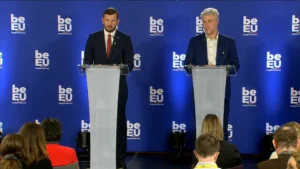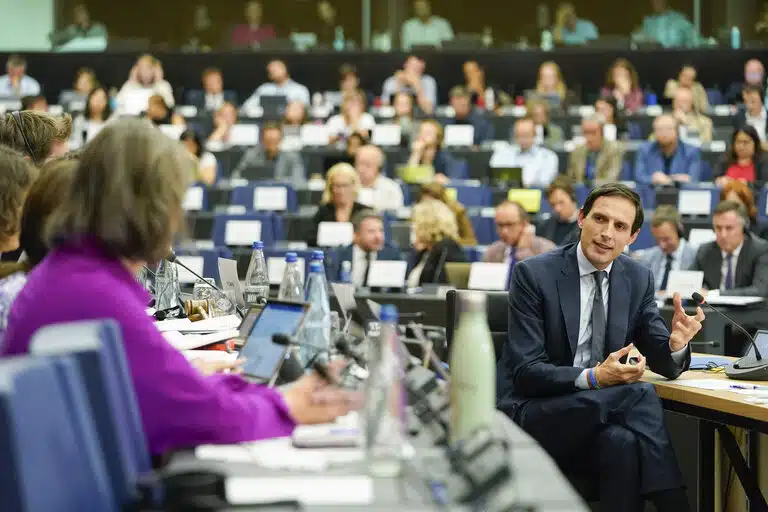Brussels – The 2040 climate target in February, the communication against climate risks and the water resilience initiative in March. The first Informal Environment Council under the Belgian Presidency held yesterday and today (January 15 and 16) in Brussels dictated the agenda on the latest legislative priorities that will engage the European Commission in the first quarter of the year. Starting in April, due to the need to “prepare” to go to the polls in June, the EU executive will not present anything else.
Target 2040 without leaving anyone behind
In early February, “a communication and detailed impact assessment of the climate target for 2040 will arrive within six months of the comprehensive assessment, in line with the European Climate Act,” European Environment Commissioner Virginijus Sinkevičius confirmed at a press conference today, pointing out that—in line with the European Climate Act—the assessment will be accompanied by a report on the EU indicative greenhouse gas budget for the 2030-2050 period.
According to the last college meeting agenda, the proposal is expected to arrive on February 6. European environment ministers started discussions on the new intermediate climate target at the December Environment Council, later returning to the issue at today’s informal meeting. A discussion that was also “informal” during a working lunch that so far has focused on “how to maintain high ambition, in the context of a just transition and maintaining social cohesion,” summarized Belgian Minister of Climate Transition and Environment, Alain Maron, who chaired the meeting.

The EU’s scientific advisors suggested Brussels propose a 90 per cent reduction in emissions (from 1990 levels) by 2040, publishing a study with recommendations on technological feasibility, environmental limits and risks, and international cooperation. European Commissioner for Climate Action, Wopke Hoekstra, and Executive Vice President for the Green Deal, Maros Sefcovic, have made it clear on more than one occasion that they will support the 90 per cent target.
Although discussions are still in an early stage, according to the Belgian minister, there is no opposition among ministers for the time being to such a level of ambition. “No one has asked for a lower target,” he pointed out, without hiding, however, that there is “concern about the funds” needed to achieve it.
The Climate Law and the intermediate target
In essence, the EU Climate Law (adopted in Brussels in 2021) commits the European Union, among other things, to a new intermediate target for 2040 and an indicative projected EU greenhouse gas budget for the 2030-2050 period, that is, how much net greenhouse gas emissions can be emitted in that timeframe without jeopardizing the Union’s commitments.
This law set a target to reduce greenhouse gas emissions by 55 per cent by 2030 compared to 1990 levels. 2040 is the second intermediate target before reaching carbon neutrality in 2050. The timing of discussions for 2040 is closely linked to the five-year ambition cycle of the 2015 Paris Climate Agreement, which sets a commitment to limit temperature rise to within 1.5°C. All parties to the agreement are expected to start thinking about the next target this year and then communicate it before the COP29 (29th United Nations Climate Change Conference) to be held next year in Baku, Azerbaijan.
Not only climate
There is more to Brussels’ plans than an intermediate target for 2040. The environment commissioner confirmed that in March the European Commission will propose one communication against risks from climate change and one for water resilience. As for the former, the main goal will be “to better protect our citizens and our economy from the consequences of climate change,” Sinkevicius anticipated.
As for water resilience, the initiative was announced by President Ursula von der Leyen in September in her State of the Union Address, designed to ensure access to water for citizens, nature, and the economy while addressing catastrophic flooding and water shortages in Europe. “We will chart the ground and consider how to ensure that water contributes to a just, sustainable and resilient economy,” the commissioner further explained. He assured that no lists “of priorities in water use” will be drawn up, but efforts will be made to focus on efficient use of the resource.
English version by the Translation Service of Withub






